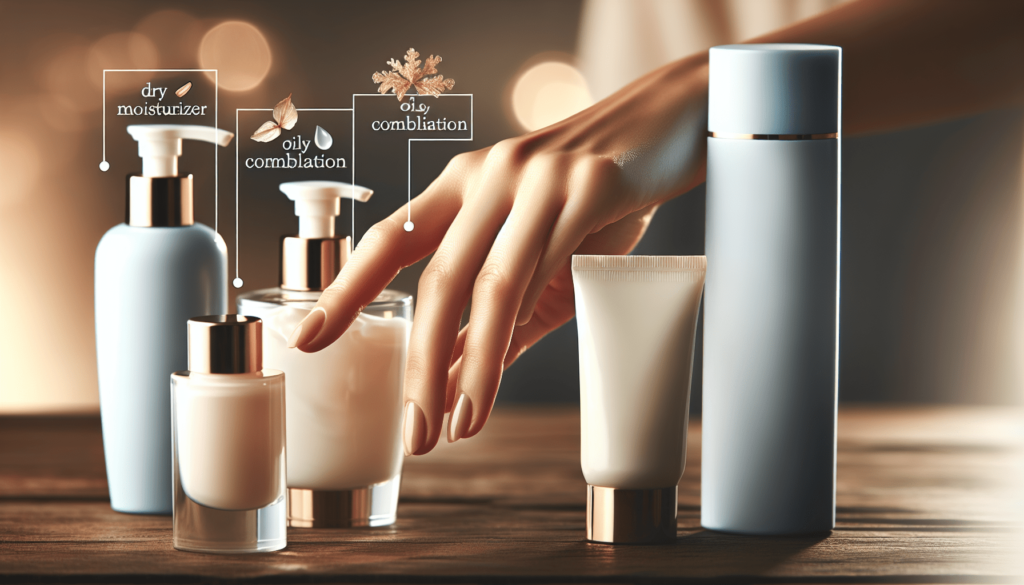Looking for the perfect moisturizer for your skin type? Look no further! In this article, we’ll guide you through the process of choosing the right moisturizer to keep your skin hydrated and glowing. With detailed and focused advice, we’ll act as your personal esthetician, providing you with valuable tips and references to ensure you find the best moisturizer for your specific needs. Whether you have dry, oily, or sensitive skin, we’ve got you covered. Say goodbye to guesswork and hello to a well-nourished complexion. Let’s dive right in!
Understanding Your Skin Type
Determining your skin type
Understanding your skin type is crucial when it comes to choosing the right moisturizer. To determine your skin type, start by washing your face with a gentle cleanser and patting it dry. After 30 minutes, observe your skin in a well-lit area and take note of any noticeable characteristics.
Common skin types
There are four common skin types: dry, oily, combination, and sensitive. Each skin type has its own unique needs and requires specific care.
Characteristics of each skin type
- Dry skin: Dry skin often feels tight and flaky, especially after cleansing. It may have fine lines and a dull appearance.
- Oily skin: Oily skin tends to feel greasy and may be prone to acne and shine. The pores may appear enlarged and the skin has a glossy appearance.
- Combination skin: Combination skin is a mix of dry and oily areas. The T-zone, which includes the forehead, nose, and chin, tends to be oilier, while the cheeks and jawline may be drier.
- Sensitive skin: Sensitive skin is easily irritated and may react to certain ingredients or environmental factors. It often appears red and may feel itchy or tight.
Identifying Your Skin Concerns
Assessing your skin concerns
Determining your skin concerns is important in choosing a moisturizer that addresses your specific needs. Common concerns include dryness, oiliness, uneven texture, acne, fine lines, and sensitivity.
Noting any specific problems
Apart from the common concerns, it’s essential to take note of any specific problems you may have, such as rosacea, eczema, or hyperpigmentation. These conditions require extra care and consideration when selecting a moisturizer.
Prioritizing your concerns
If you have multiple skin concerns, it’s important to prioritize them. Start by addressing your main concern and then choose a moisturizer that also provides some benefits for your secondary concerns.
Reading Product Labels
Understanding ingredient lists
Product labels often list the ingredients in a moisturizer. It’s important to familiarize yourself with common ingredients and their purpose to make an informed decision. Keep in mind that ingredients are listed in descending order of concentration, so the first few ingredients have the highest concentration.
Identifying beneficial ingredients
Look for beneficial ingredients that cater to your skin type and concerns. For example, hyaluronic acid and glycerin are excellent moisturizing ingredients for dry skin, while salicylic acid and niacinamide can help control oiliness in oily skin.
Avoiding harmful ingredients
Certain ingredients can be harmful to your skin. Avoid moisturizers that contain parabens, sulfates, synthetic fragrances, and dyes, as these can potentially irritate or damage your skin. Instead, opt for products with natural and gentle ingredients.
Moisturizers for Dry Skin
Choosing a rich, emollient formula
For dry skin, it’s important to choose a moisturizer with a rich and emollient formula. These moisturizers provide intense hydration and help to repair the skin barrier. Look for keywords such as “deeply nourishing” or “intensive hydration” on product packaging.
Looking for ingredients like hyaluronic acid or glycerin
Hyaluronic acid and glycerin are excellent ingredients for moisturizing dry skin. Hyaluronic acid attracts and retains moisture, while glycerin helps to prevent moisture loss, leaving your skin feeling hydrated and supple.
Considering cream or ointment texture
Creams and ointments are great choices for dry skin as they have a thicker consistency that helps lock in moisture. Look for products labeled as creams or ointments, as they tend to provide a more intensive moisturizing effect.
Moisturizers for Oily Skin
Opting for lightweight, oil-free moisturizers
For oily skin, it’s important to choose a moisturizer that is lightweight and oil-free. These moisturizers provide hydration without adding excess oil to the skin. Look for terms like “oil-free” or “non-comedogenic” on product labels.
Seeking ingredients like salicylic acid or niacinamide
Salicylic acid and niacinamide are beneficial ingredients for oily skin. Salicylic acid helps unclog pores and control oil production, while niacinamide regulates sebum production and reduces redness. Look for these ingredients in your moisturizer.
Choosing gel or lotion texture
Gel or lotion textures work well for oily skin as they are lightweight and absorb quickly. These formulations provide adequate hydration without leaving behind a greasy residue, keeping your skin feeling fresh and balanced.
Moisturizers for Combination Skin
Balancing hydration with lightweight formulas
Combination skin requires a moisturizer that balances hydration without making the oily areas greasier or the dry areas drier. Look for moisturizers that offer lightweight formulas to cater to the varying needs of your skin.
Finding products that address both dry and oily areas
It’s important to find moisturizers that address both the dry and oily areas of your face. Look for products that are specifically formulated for combination skin or ones that address both oiliness and dryness.
Using moisturizers with a lotion or serum consistency
Moisturizers with a lotion or serum consistency work well for combination skin. These formulations provide hydration without leaving a heavy residue, ensuring that both your dry and oily areas are adequately moisturized.
Moisturizers for Sensitive Skin
Choosing fragrance-free and hypoallergenic options
When choosing a moisturizer for sensitive skin, it’s crucial to opt for fragrance-free and hypoallergenic options. Fragrances can be potential irritants, while hypoallergenic products are specifically designed to minimize the risk of allergic reactions.
Looking for soothing ingredients like aloe vera or chamomile
Soothing ingredients like aloe vera or chamomile are excellent choices for sensitive skin. These ingredients help calm and reduce inflammation, providing relief to sensitive and easily irritated skin.
Opting for gentle, non-irritating formulas
Sensitive skin requires gentle and non-irritating formulas. Look for moisturizers that are specifically labeled for sensitive skin or those that are dermatologically tested to ensure they do not cause any adverse reactions.
Moisturizers for Aging Skin
Considering anti-aging ingredients like retinol or peptides
When it comes to aging skin, it’s beneficial to choose moisturizers that contain anti-aging ingredients like retinol or peptides. Retinol helps to stimulate collagen production and reduce the appearance of fine lines, while peptides support the skin’s natural repair process.
Choosing products with hydrating properties
Moisturizers for aging skin should have hydrating properties to combat dryness and improve skin elasticity. Look for ingredients like hyaluronic acid or ceramides, which help retain moisture and improve the skin’s overall hydration levels.
Opting for creams or serums with added antioxidants
Antioxidants play a crucial role in protecting the skin from environmental damage and can help reduce the signs of aging. Look for moisturizers that contain antioxidants such as vitamin C or green tea extract to help maintain a youthful complexion.
Trial and Error
Sampling different products
Finding the right moisturizer often involves some trial and error. It’s a good idea to sample different products before committing to one. Many brands offer sample sizes or travel sets, allowing you to try the product for a shorter duration before investing in a full-sized product.
Observing the effects on your skin
When trying out different moisturizers, pay close attention to how your skin reacts. Observe if the moisturizer provides the desired level of hydration, if it improves the appearance of your skin, or if it causes any negative reactions like redness or breakouts.
Adjusting your moisturizer based on results
Based on your observations, make adjustments to your moisturizer accordingly. If you find that a certain product is not suitable for your skin type or concern, try another one that caters to your specific needs. Remember, what may work for others may not necessarily work for you.
Seeking Professional Advice
Consulting a dermatologist or esthetician
If you’re unsure about your skin type or have specific skin concerns, it’s always advisable to seek professional advice. Dermatologists and estheticians are trained professionals who can analyze your skin and provide personalized recommendations based on your individual needs.
Getting personalized recommendations
A skincare professional can recommend specific moisturizers based on your skin type, concerns, and any underlying skin conditions you may have. They can guide you towards the most suitable products and provide expert advice on how to best care for your skin.
Considering any underlying skin conditions or allergies
If you have underlying skin conditions or allergies, it’s important to inform your skincare professional. They will take these factors into account when recommending moisturizers to ensure that they do not exacerbate any existing skin issues or cause allergic reactions.
Choosing the right moisturizer for your skin type is essential for maintaining healthy and radiant skin. By understanding your skin type, identifying your specific concerns, and reading product labels, you can make informed decisions about the moisturizers that will best meet your needs. Through trial and error, and with the guidance of skincare professionals, you can find the perfect moisturizer to nourish, protect, and enhance your skin.

